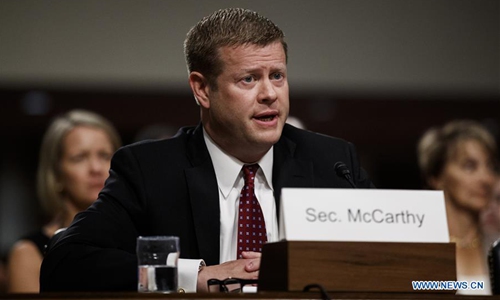HOME >> OPINION
US fishes interests by creating a mess in SCS
Source:Global Times Published: 2020/1/22 17:43:40

US Army Secretary Ryan McCarthy. File photo: Xinhua
The US Army is currently competing with other branches of the US military for dominance in the Indo-Pacific Strategy. It wants to increase the army's weight in the strategy and get a larger pie of the military budget. US Army Secretary Ryan McCarthy said at an event in Washington DC on January 10 that the US Army will expand efforts to counter China by deploying a specialized task force to the Pacific capable of conducting information, electronic, cyber and missile operations against Beijing, Bloomberg reported.
According to a Voice of America Chinese report, the deployment could be in the waters around China's Diaoyu Islands or in the South China Sea. It is a move to implement US Indo-Pacific Strategy while at the same time emphasizing the importance of US Army in the Indio-Pacific region.
As US national strategy has changed from focusing on anti-terrorism to superpower competition, the core of US Indo-Pacific Strategy - which can be said to be tailored for China - is to deal with the Asian giant. Thus, the US has been leaning toward the Indo-Pacific region in both strategy making and military deployments.
Currently, the Asia-Pacific region, particularly the Indo-Pacific, is becoming increasingly unstable, which will impede China's "going out" strategy. The US aims at changing political and economic structure globally and strategically containing China based on its own interests.
A standoff took place in early January between China's Coast Guard vessels and Indonesia's warships in the South China Sea near Indonesia's Natuna Islands. Jakarta also flew fighter jets over the waters. In June 2016, Chinese Foreign Ministry spokesperson Hua Chunying said that China doesn't have sovereignty dispute with Indonesia, but that the two countries "have overlapping claims for maritime rights and interests." The reason for Jakarta's tough stance toward Beijing is veiled US support for the archipelago country.
The US, an outsider in the South China Sea region, regards itself as an insider and wants to steer China-ASEAN negotiations on the Code of Conduct (COC) in the South China Sea. Therefore, Washington has repeatedly interfered in the South China Sea row, demanded that China act in line with the United Nations Convention on the Law of the Sea, and deliberately ignored China's traditional rights in the waters marked by the nine-dash line. In addition, the US encourages countries like Indonesia and Vietnam to provoke China over the South China Sea dispute and create friction. This is how Washington plays its cards in the region.
The US has been trying to contain China's development by infringing on the country's sovereignty. Meddling in the South China Sea dispute, Washington aims to hinder China's development and disrupt the Asian country's rise. The US cannot bear to see China growing to be capable of competing with it and even leading it, so it spares no effort to pressure and suppress Beijing.
The US is not happy to see China and ASEAN sign the COC that is in the interest of both sides, as it would thus lose an important ASEAN card. Hence, Washington has repeatedly stirred up trouble to obstruct China and ASEAN from signing a peace agreement. This is determined by US interests as well as the country's actual need to contain and suppress China. It is an unquestionable fact that Washington is creating a mess in the South China Sea.
The Philippines is an important country surrounding the South China Sea and also a crucial member of ASEAN. During Philippine President Rodrigo Duterte's tenure, China-Philippine ties have made significant win-win progress in many aspects, including setting aside dispute and pursuing joint development. Duterte has adopted a relatively pragmatic approach. He is not interested in making the Philippines a pawn of the US to contain China, and thus Manila and Beijing can develop a benign relationship.
But the US wouldn't let go of any chance to woo the Philippines. According to VOA Chinese, McCarthy said during his January 10 speech that the US Army has been in close cooperation with Filipino military in counter-terrorism and is seeking to expand this traditional cooperation to jointly cope with the increasing security challenge brought by China.
Nonetheless, Manila and Beijing maintain the South China Sea as a sea of peace, stability, and prosperity, setting an example on how to properly settle disputes related to the region's affairs. This is in line with the interests of all sides. But the US doesn't want to see a sea of peace and stability, after all, it prefers to benefit from chaos.
The US Indo-Pacific Strategy is offensive and challenges China's national security, sovereignty, and development. Washington comes prepared, and Beijing must attach enough importance to the move and be ready with countermeasures to safeguard its own core interests.
The article was compiled by Global Times reporter Xu Hailin based on an interview with Song Zhongping, a military expert and TV commentator. xuhailin@globaltimes.com.cn
Posted in: VIEWPOINT